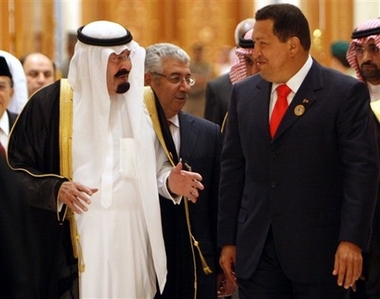Chavez: US attack on Iran will spike oil
Updated: 2007-11-18 08:55
RIYADH, Saudi Arabia - In his opening address of a rare OPEC summit, Venezuelan President Hugo Chavez warned the United States on Saturday that oil prices would further surge if the US contemplates an attack against his country or Iran.
|
|
The summit of Organization of Petroleum Exporting Countries opened Saturday in Saudi Arabia, with heads of states and delegates from 12 of the world's biggest oil-producing nations. Chavez warned that the US should not target OPEC members for foreign policy reasons.
"If the United States attempts the madness of invading Iran or attacking Venezuela again, the price of oil is probably going to reach $200, not just $100," Chavez said.
While Iran has been in a standoff with the US over its nuclear program, left-wing Chavez is a bitter antagonist of President Bush.
"We are witnessing constant threats against Iran. I think OPEC should strengthen itself in this capacity and demand respect for the sovereignty of our nations, if the developed world wants a guaranteed supply of oil."
Minutes after Chavez declared that the OPEC should "assert itself as an active political agent," Saudi King Abdullah appeared to rebuke the Venezuelan, insisting that "OPEC has always acted moderately and wisely."
"Oil shouldn't be a tool for conflict, it should be a tool for development," said the king, a close US ally whose country is the world's largest oil producer.
It was the third full OPEC summit since the organization was created in 1960.
The run-up to the meeting was dominated by speculation over whether OPEC would raise production following recent oil price increases that have closed in on $100.
US Energy Secretary Samuel Bodman called on OPEC to increase production earlier this week, but cartel officials have said they will hold off any decision until the group meets next month in Abu Dhabi, United Arab Emirates.
They have also cast doubt on the effect any output hike would have on oil prices, saying the recent rise has been driven by the falling dollar and financial speculation by investment funds, rather than any supply shortage.
Saudi Arabia opposed a move by Iran on Friday to have OPEC include concerns over the falling dollar included in the summit's closing statement after the weekend meeting.
|
|
|
||
|
||
|
|
|
|
